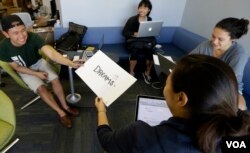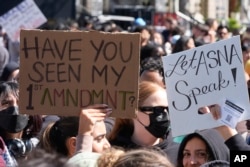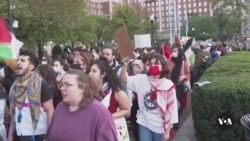Student Union
- By Aline Barros
Asian-Americans Largest Group of Naturalized Immigrants
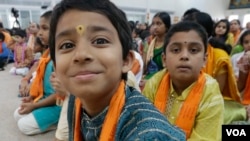
Applications for citizenship have steadily increased in recent decades, and Asian-Americans have the highest naturalization rates in the United States, according to the Department of Homeland Security (DHS).
Thirty-five percent -- or 261,374 of the 730,259 new Americans in 2015 -- were Asian-American. Legal permanent residents, or green card holders, from India, Philippines and China were among the top nationals applying for U.S. naturalization.
The countdown to become a naturalized citizen begins when an immigrant obtains a green card. The green card program gives them “permanent resident” status, allowing them to live and work in the U.S. After five years, a permanent resident can apply for naturalization. If they became legal residents by marrying a citizen, the wait is three years.
Naturalization, or citizenship, gives new Americans the right to vote, a U.S. passport, and the right to hold elected office in most states and counties.
But only a small fraction apply. In 2013, 8 million people were eligible to become citizens, DHS said. One reason is cost, said Marita Etcubanez, director of strategic initiatives at AAJC. Citizenship applicants must pay $725.
Soo Yee moved to the U.S. from South Korea in 2000 on a student visa. She has a bachelor’s degree in psychology from the University of Maryland and a master’s degree in health education from Baylor University in Texas.
[For more stories about student visas, see here.]
After she became a naturalized U.S. citizen, she sponsored her parents to emigrate to the U.S. Now they live with her in Virginia.
She is the president of Korean American Outreach Group and is a certified health education specialist, consultant and educator."Without their support, it's difficult for me to work," said Yee, a certified health education specialist, consultant and educator.
She is also the founder of the Korean American Outreach Group, which helps other Asian immigrants with green cards to apply for naturalization. Without her parents, Yee said at a weekend meeting, "I wouldn't be here on a Saturday morning."
Organizations, such as the Asian Americans Advancing Justice Center (AAJC), where Yee also volunteers, frequently hold citizenship clinics to help green card holders navigate the process.
The AAJC clinics are part of a nationwide initiative called the New Americans campaign, funded by private foundations that help community groups help as many immigrants as possible to naturalize.
Relatives and government jobs
Twenty volunteers at a recent clinic in suburban Maryland helped immigrants check in, fill out a 20-page form, and verify necessary documents.
"I understand how difficult it is. Even for myself … every time I try to fill in any government application, it's overwhelming," Yee said. She received the same assistance when she was applying for U.S. citizenship.
"[I tell them] every angle of their lives matter [when] they're citizens because it's the only way they can voice their needs," Yee said. "They gain the ownership of where they live. And the more Asians get citizenship [status], that means more votes. That means more power to address their voice."
Most Asian applicants like herself, Yee said, are most interested in sponsoring relatives or getting federal government jobs.
Yee and other advocates said the Asian community sees federal employment as steady income, good benefits and stability for the family.
Surge expected
Etcubanez projects a surge in naturalization applications in the coming months.
A lot has to do with fear, she said, about President Donald Trump's executive orders to ban travelers from six nations and to stop illegal immigration. A set of guidelines issued in February by DHS Secretary John Kelly expanded the priority list for immigrants who face immediate removal, summarized a plan to hire thousands of enforcement agents, and assigned local authorities to act as immigration officers to apply immigration laws.
Green card holders are not generally subject to arrest and deportation, but Etcubanez says, "Folks are concerned."
Citizenship seems like a safe harbor.
"Once you become a U.S. citizen you don't have to worry about deportation," Etcubanez said. "You're not in danger. You don't have to worry about jeopardizing your immigration status in any way, right. You're set."
See all News Updates of the Day
- By VOA News
Paper: International students faced extra pandemic challenges
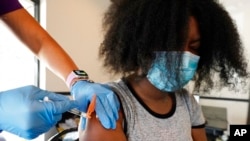
Astrobites, which describes itself as "a daily astrophysical literature journal written by graduate students in astronomy since 2010," focuses on the challenges international students faced during the COVID-19 pandemic.
It examines a paper published in the Journal of Comparative & International Higher Education entitled The Impact of the COVID-19 Pandemic on International Students in a Public University in the United States: Academic and Non-academic Challenges.
Read the Astrobites article here. (April 2024)
- By VOA News
15 cheapest US universities for international students
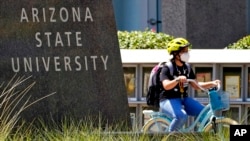
Yahoo!Finance has compiled a list of the 15 cheapest U.S. universities for international students.
Among them: Arizona State University, the University of North Carolina at Chapel Hill and Michigan State University.
Read the list here. (March 2024)
- By VOA News
Studying STEM? International students have funding options

US News & World Report takes a look at funding options for international students pursuing STEM degrees in the U.S.
The article explains the different kinds of scholarships and grants and offers tips on getting part-time jobs and private student loans. Read the full story here. (March 2024)
- By Robin Guess
US campuses are battlegrounds in free speech debate

This week the University of Southern California canceled the graduation speech of its senior class valedictorian at a time when there is a growing debate over the limits of free speech on American college campuses.
USC’s Asna Tabassum, a Muslim biomedical engineer major, was selected from among 100 outstanding students to address the graduating class of 2024 this May. However, the school withdrew the invitation for her to speak at the graduation ceremony citing safety concerns.
Tabassum denounced the decision, which she attributed to her public support for Palestinian human rights. She said it is part of “a campaign of hate meant to silence my voice.”
The school maintains it is a safety issue, not about free speech. School officials say they received an alarming number of violent threats after selecting her as speaker.
USC is one of many American universities that have struggled with policies over free speech and campus protest since October’s Hamas terrorist attack on Israel and the continuing fighting in Gaza. After weeks or months of on-campus protests and rallies, schools have been taking more forceful action to punish protesters who administrators say have become disruptive.
On Thursday at Columbia University in New York, police arrested more than 100 students who had gathered on campus for pro-Palestinian protests. The school’s dean wrote that the protesters had been told several times that they were violating university policies and would be suspended. The students say they were exercising their free speech rights.
At Washington’s American University, protests in all campus buildings have been banned by the school’s president since January. Under the new policy, students may not hold rallies, engage in silent protests or place posters in any campus building.
Protests and safety
University students have a long history of engaging in political activism. From the Vietnam War to abortion rights, universities have played a key role in American political debates.
However, students now say that schools like AU with a long-standing protest culture are silencing protesters with new rules.
Arusa Islam, American University student body president-elect and current vice president, says the policies are preventing an open discussion about U.S. foreign policy.
“Indoor protesting was never a problem, it was never an issue before October 7th,” Islam said. “Students were allowed to put up posters in buildings and students were allowed to have a silent protest.”
“And now we don’t have that right anymore,” she added. “We have been silenced and it is affecting us greatly.”
American University’s president, Sylvia Burwell, says the school’s new policies are intended to ensure that protests do not disrupt university activity.
Burwell also referred to recent events on campus that “made Jewish students feel unsafe and unwelcome.” She added, antisemitism is abhorrent, wrong, and will not be tolerated at American University.
While administrators insist that they are making narrow restrictions in the interests of providing an education, critics say the policies have a far-reaching effect.
At Cornell University, where new rules took effect in January, Claire Ting, the executive vice president of the Cornell Student Assembly, said the policies have had an unsettling effect on campus.
“The campus climate at Cornell has been tense surrounding free speech in recent times,” Ting emailed VOA.
Ting said that both students and faculty feel the policy has had chilling effects on free expression.
“Students report facing arbitrary, escalating punishment for violating the policy, with the policy itself lacking clear outlines for the consequences of civil disobedience,” she added.
In its new policy Cornell warns students that disciplinary action may be taken if protests impede people or traffic, damage school property or interfere with the school’s operations in any way.
In its campus-wide notice explaining the new guidelines, the school wrote that the new policy would ensure that expressive activity is allowed but must remain nonviolent.
The Foundation for Individual Rights in Education, also known as FIRE, has tracked free speech issues on American campuses.
FIRE and College Pulse have produced an annual survey, since 2022, ranking colleges based on their policies and what students say about the free speech climate on campus.
This year the group reported that “alarming” numbers of students say they self-censor or “find their administrations unclear” on free speech issues.
“College campuses have always been places where students have been unafraid to express themselves and with the recent Gaza conflict after the 10/7 attacks, it’s been very heated on both sides of this issue,” said Zach Greenberg, the senior program officer of FIRE.
Harvard ranked last in this year’s survey. FIRE said the school punished some professors and researchers over what they had said or written, and students reported a poor climate for free speech on campus.
The controversy came to Congress late last year, when Harvard’s president testified over complaints of widespread antisemitism.
“I don’t think you’d find many students on campus right now that would say we are the model for flourishing free speech and ideas exchange in the country,” said J. Sellers Hill, president of Harvard’s school newspaper The Harvard Crimson.
“But I think you’ve really seen that be acknowledged by administrators and it seems to be something they are dedicated to taking on.”
As the head of The Harvard Crimson, Hill manages the paper’s 350 editors and 90 reporters, who’ve covered, in detail, the ongoing free speech/protests controversy and the resignation of former President Claudine Gay following her testimony to Congress.
“I think no one would dispute Harvard has work to do and progress to make,” Hill said. “I think it’s a tough sell, for me, that Harvard is uniquely in its own league in terms of intolerance of speech. That doesn’t square with what I have seen on our college campus or on other college campuses around the country. I think Harvard is held to a higher standard.”
Proposed settlement offered over financial aid allegations
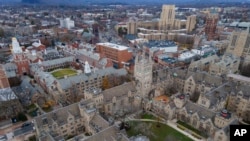
A group of U.S. colleges and universities have agreed to settle a lawsuit alleging deceptive financial aid tactics, according to a report published in The Hill.
The schools would pay $284 million to plaintiffs who were enrolled full-time and received financial aid between 2003 and 2024.
The schools have denied the allegations. (April 2024)




